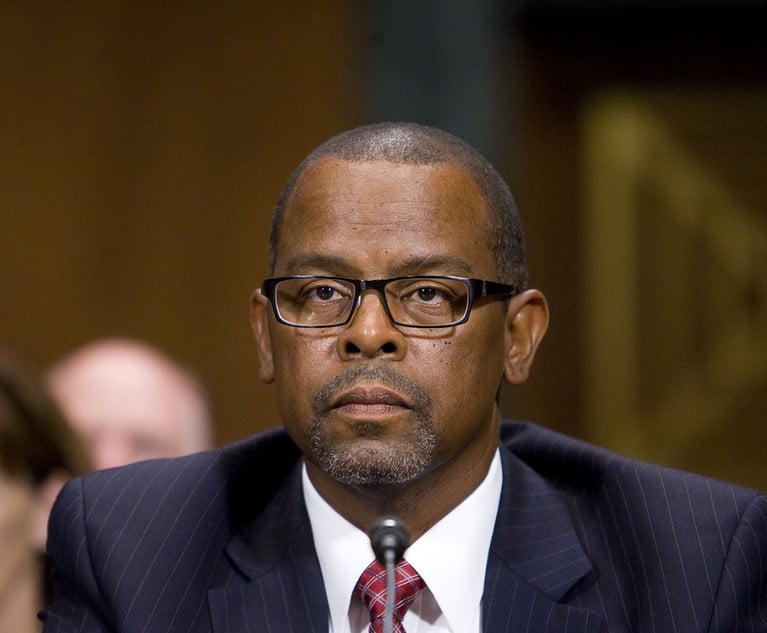Justice Dept. Warns SCOTUS of 'Massive' Fallout From Native American Case
A U.S. Supreme Court capital case could expand the federal jurisdiction over crimes involving Indians in eastern Oklahoma, including Tulsa.
March 13, 2018 at 03:16 PM
5 minute read
 U.S. Solicitor General's Office at Main Justice. Credit: Mike Scarcella/ALM
U.S. Solicitor General's Office at Main Justice. Credit: Mike Scarcella/ALM
The U.S. Department of Justice and Oklahoma business, oil and gas interests are worried that a Native American death penalty case at the U.S. Supreme Court could “radically” upend state civil, regulatory and criminal jurisdiction in eastern Oklahoma, including the city of Tulsa.
The case, Royal v. Murphy, raises issues the justices have wrestled with in the past but rarely in the form of a death penalty case. And the question itself offers little hint of the unusually high stakes presented by the Oklahoma challenge.
“If not corrected, the decision below could result in the largest abrogation of state sovereignty by a federal court in American history,” contends Lisa Blatt, partner at Arnold & Porter Kaye Scholer and counsel to Terry Royal, warden of the Oklahoma State Penitentiary.
Blatt's petition asks the justices: Do the 1866 territorial boundaries of the Creek Nation within the former Indian Territory of eastern Oklahoma constitute an “Indian reservation” today under the federal law defining “Indian country”?
Blatt contends the U.S. Court of Appeals for the Tenth Circuit was wrong when it held that Congress never “disestablished”—extinguished—the Creek Reservation. The court's ruling meant that the federal government, not the state, had jurisdiction to prosecute Patrick Murphy, a member of the Creek Nation, who allegedly killed another Creek Indian.
“Prisoners have begun seeking post-conviction relief in state, federal and even tribal court, contending that their convictions are void ab initio,” Blatt wrote in her petition. “Civil litigants are using the decision to expand tribal jurisdiction over nonmembers.”
Blatt said the Tenth Circuit decision “creates intolerable uncertainty for over 1.8 million Oklahomans who may now live on an Indian reservation, with all the civil, criminal and regulatory consequences that could flow from that determination.”
The Justice Department, agreeing with the potential ramifications of the lower court decision, filed a rare, “uninvited” amicus brief this week supporting Blatt's petition.
The Tenth Circuit, in a 126-page opinion in August, applied the three-part framework in a 1984 Supreme Court decision that the court said governs evaluating whether Congress has disestablished an Indian reservation.
“The most important evidence—the statutory text—fails to reveal disestablishment at step one,” Judge Scott Matheson Jr. wrote for the panel. “Instead, the relevant statutes contain language affirmatively recognizing the Creek Nation's borders. The evidence of contemporaneous understanding and later history, which we consider at steps two and three, is mixed and falls far short of 'unequivocally revealing' a congressional intent to disestablish.”
The Tenth Circuit denied rehearing by the full court in November. But Chief Judge Timothy Tymkovich, who concurred in the denial, said he was not “without sympathy” for Oklahoma's argument that a series of actions by Congress effectively achieved de facto disestablishment. But the 1984 Supreme Court decision—Solem v. Bartlett—makes clear, he added, that Congress must explicitly act to extinguish reservation status. Tymkovich said “this challenging and interesting case makes a good candidate for Supreme Court review.”
U.S. Solicitor General Noel Francisco, in the Justice Department's brief supporting Blatt's petition, argued the Tenth Circuit decision would result in a “massive increase” in federal law enforcement responsibilities in Indian-related crimes.
In 2017, federal prosecutors brought three felony indictments based on Indian country jurisdiction. That number, Francisco said, could increase to more than 500 annually, and misdemeanor prosecutions would add more to the caseload.
Blaine Evanson of Gibson, Dunn & Crutcher, representing the Oklahoma Independent Petroleum Association, argued in an amicus brief that if the lower court decision is not corrected, it “will replace Oklahoma's mature and stable regulatory regime with a new and uncertain regime of overlapping tribal, federal and state regulation. It will take years, perhaps decades, of litigation to determine the effects of this new regulatory structure.”
The state Chamber of Oklahoma, the Environmental Federation of Oklahoma and a number of local farm bureaus also urge the Supreme Court to grant review and reverse the Tenth Circuit.
“The decision threatens to authorize tribal taxation of activities and properties, to invest tribal courts with broader jurisdiction, and to authorize greater, or potentially exclusive, tribal and federal regulation over lands within the area,” their counsel, Lynn Slade of Modrall Sperling, Roehl, Harris & Sisk in Albuquerque, New Mexico, wrote in a brief.
In the Supreme Court, Murphy is represented by Patti Ghezzi, a federal public defender in Oklahoma City. Ghezzi's brief in response to the Blatt petition is not due until April. Ghezzi was Murphy's counsel in the lower court, where she was supported by a number of Indian nations.
In the Tenth Circuit, Ghezzi said claims by Royal, the United States and others that federal courts would be flooded with thousands of petitions for habeas corpus were an “exaggeration.” Many inmates, she argued, won't choose to risk harsher federal penalties and no parole.
“The court knew there would be effects from its decision,” Ghezzi said in the lower court. “And, it recognized it could not pre-emptively identify or resolve speculative matters. The court noted more than once that Congress, not the court, has unilateral power to disestablish reservation boundaries.”
This content has been archived. It is available through our partners, LexisNexis® and Bloomberg Law.
To view this content, please continue to their sites.
Not a Lexis Subscriber?
Subscribe Now
Not a Bloomberg Law Subscriber?
Subscribe Now
NOT FOR REPRINT
© 2024 ALM Global, LLC, All Rights Reserved. Request academic re-use from www.copyright.com. All other uses, submit a request to [email protected]. For more information visit Asset & Logo Licensing.
You Might Like
View All
‘Really Deflating’: Judges React to Biden Threat to Veto New Judgeships Bill


Justices Consider Scope of Corporate Remedies for Trademark Infringement

Albertsons Gives Up on $25B Merger, Sues Kroger Seeking 'Billions of Dollars'
Trending Stories
- 1As Global Law Firm Mergers Keep Coming, Will There Ever Be a New Swiss Verein?
- 2Nervous System: Grace Hopper’s Neutral Corner
- 34th DCA: 'Trial Court Erred;' Big Law Partial Victory after $82M Flo Rida Verdict Appeal
- 4Dispute Over Failure to Accommodate Disability Ends in $900K Settlement
- 5FTC, DOJ Withdrawal of Antitrust Guidelines for Collaboration Infuriates Republicans
Who Got The Work
Michael G. Bongiorno, Andrew Scott Dulberg and Elizabeth E. Driscoll from Wilmer Cutler Pickering Hale and Dorr have stepped in to represent Symbotic Inc., an A.I.-enabled technology platform that focuses on increasing supply chain efficiency, and other defendants in a pending shareholder derivative lawsuit. The case, filed Oct. 2 in Massachusetts District Court by the Brown Law Firm on behalf of Stephen Austen, accuses certain officers and directors of misleading investors in regard to Symbotic's potential for margin growth by failing to disclose that the company was not equipped to timely deploy its systems or manage expenses through project delays. The case, assigned to U.S. District Judge Nathaniel M. Gorton, is 1:24-cv-12522, Austen v. Cohen et al.
Who Got The Work
Edmund Polubinski and Marie Killmond of Davis Polk & Wardwell have entered appearances for data platform software development company MongoDB and other defendants in a pending shareholder derivative lawsuit. The action, filed Oct. 7 in New York Southern District Court by the Brown Law Firm, accuses the company's directors and/or officers of falsely expressing confidence in the company’s restructuring of its sales incentive plan and downplaying the severity of decreases in its upfront commitments. The case is 1:24-cv-07594, Roy v. Ittycheria et al.
Who Got The Work
Amy O. Bruchs and Kurt F. Ellison of Michael Best & Friedrich have entered appearances for Epic Systems Corp. in a pending employment discrimination lawsuit. The suit was filed Sept. 7 in Wisconsin Western District Court by Levine Eisberner LLC and Siri & Glimstad on behalf of a project manager who claims that he was wrongfully terminated after applying for a religious exemption to the defendant's COVID-19 vaccine mandate. The case, assigned to U.S. Magistrate Judge Anita Marie Boor, is 3:24-cv-00630, Secker, Nathan v. Epic Systems Corporation.
Who Got The Work
David X. Sullivan, Thomas J. Finn and Gregory A. Hall from McCarter & English have entered appearances for Sunrun Installation Services in a pending civil rights lawsuit. The complaint was filed Sept. 4 in Connecticut District Court by attorney Robert M. Berke on behalf of former employee George Edward Steins, who was arrested and charged with employing an unregistered home improvement salesperson. The complaint alleges that had Sunrun informed the Connecticut Department of Consumer Protection that the plaintiff's employment had ended in 2017 and that he no longer held Sunrun's home improvement contractor license, he would not have been hit with charges, which were dismissed in May 2024. The case, assigned to U.S. District Judge Jeffrey A. Meyer, is 3:24-cv-01423, Steins v. Sunrun, Inc. et al.
Who Got The Work
Greenberg Traurig shareholder Joshua L. Raskin has entered an appearance for boohoo.com UK Ltd. in a pending patent infringement lawsuit. The suit, filed Sept. 3 in Texas Eastern District Court by Rozier Hardt McDonough on behalf of Alto Dynamics, asserts five patents related to an online shopping platform. The case, assigned to U.S. District Judge Rodney Gilstrap, is 2:24-cv-00719, Alto Dynamics, LLC v. boohoo.com UK Limited.
Featured Firms
Law Offices of Gary Martin Hays & Associates, P.C.
(470) 294-1674
Law Offices of Mark E. Salomone
(857) 444-6468
Smith & Hassler
(713) 739-1250









